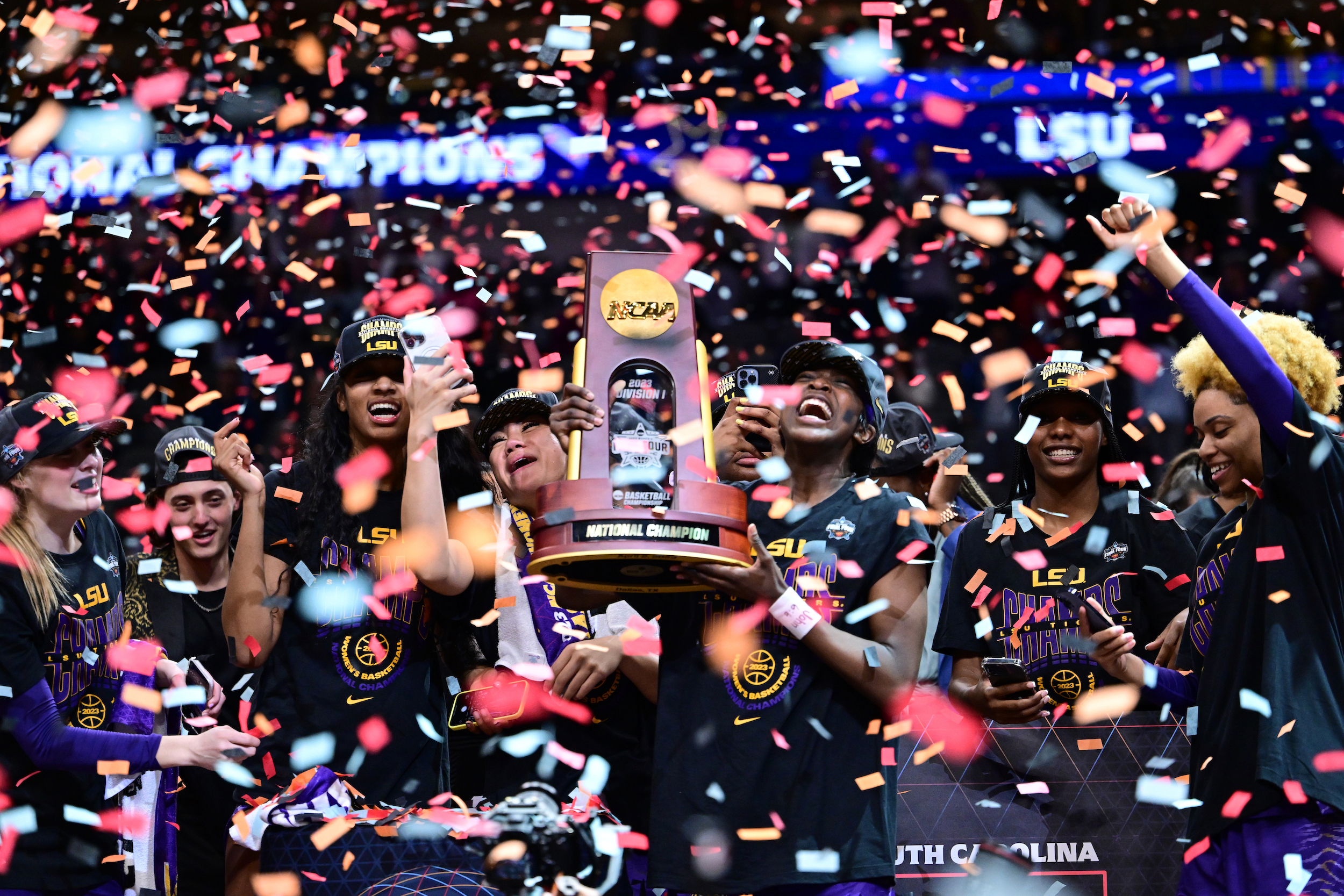No team has to be the team they were yesterday. No player, either. Before LSU won its first national championship game on Sunday evening, a 102-85 defeat of Iowa, the Tigers didn't care for three-point shots and they were an airballed free throw away from losing to Utah in the Sweet 16 and they ain't played nobody in non-conference play and Jasmine Carson was a streaky bench piece averaging eight-ish points. But that's why they play the games; there are sometimes brighter possibilities to unlock. "A fresh start," said Angel Reese, the team's star transfer, after winning in the Elite Eight round a week ago. "That's what I came to LSU for. I just wanted a fresh start."
The promise of sudden reinvention brought this team together and freed it to play its best, strangest basketball at precisely the right moment. When Reese spoke of a "fresh start," her team had just put up its worst shooting performance of the season, so offensively inoffensive that head coach Kim Mulkey said she would turn off the TV if she were watching. LSU made one three on 12 attempts in that game against Miami. In their next game, against Virginia Tech, their bench players scored zero points. But there is always another, different way to be. In the national championship game, as starters on both teams paid the price for intrusive officiating, a hero came off the LSU bench and might have won the game herself. If not mathematically, then psychically. She was Jasmine Carson, and her 21-point, 7-for-7 first half gave the Tigers a 17-point lead at halftime. "She was the game-changer tonight," her teammate Alexis Morris (a game-changer in the second half) said. The shooting bug was contagious. A team that had made 14 threes total in its five previous tournament games tacked on 11 more. Caitlin Clark and the Iowa Hawkeyes played a fine game—the National Player of the Year finished with 30 points and broke a few tournament scoring records—but they had no answer for this, and how could they? It was a brand new question.
Morris is the "veteran" on this roster, which is to say she's the only LSU player who was on the team last year. Two years after Mulkey took over for Nikki Fargas, the Tigers are something entirely different. They've been built with the modern tools of college athletics; Mulkey has aggressively worked the transfer portal and this summer hired a "director of player personnel and influence" to her staff to help players maximize NIL deals. She has a politician's sense for knowing where the wind will blow. "Everything changes. Nothing ever stays the same except for discipline," she said. Veteran though she is, Morris might be the fresh start's standard-bearer. She played at three different schools after being dismissed from Baylor for team rule violations in 2018 by none other than Kim Mulkey. Her story became a testament to the power of second chances and, naturally, to her own coach's benevolence.
Around halftime, a friend texted to say it was a shame about Mulkey's whole deal—aside from her, this team was so easy to root for. Which was true. Morris's mid-range shot itself killed three or four Iowa rallies. Those couple possessions where Reese played point-center were the dreamiest thing I’ve ever seen on a basketball court. But it also sort of underscored the point—that the whole team was built around Mulkey's cult of personality, that there is no "this team" without her drawing it all together. That's life for even the best college basketball players: to be flattened by the capital-P program and then maybe even used as proxy in the most depressing culture war imaginable. (The problem with women’s basketball’s dip into the mainstream is that the world's worst people swim up the mainstream.) Ryan Ruocco's first words after the buzzer sounded were "Kim" and "Mulkey."
When Mulkey was hired away from Baylor, she spent her surreal introductory press conference thanking people and playing Let’s Remember Some Parishes, like she was two weeks out from the primary election. This candidate campaigned in prose, then governed in poetry. “In talking about national championships, it doesn’t happen overnight,” she said in the press conference, tempering expectation already. “Let me remind you, rabid LSU fans that can be crazy and want coaches fired tomorrow, give it time. Give it time.” And though she told Holly Rowe after Sunday's game that she was “stunned” by the win, Mulkey knew the truth: With the right brand at the right school, you can win as quickly as you want to.
She raised over a million dollars in donations in her first two weeks on the job. She had new offices and training rooms built. The team’s booster club grew eight times in size and season ticket orders quintupled. Last March, after LSU fired its men’s coach, the basketball reporter Jeff Goodman quoted an LSU source saying the school would now need “an experienced coach who can deal with the pressure and also can hold their own with Kim Mulkey. She’s got a HUGE ego.” College coach with upper-case ego is nothing to write Jeff Goodman about, but how many women's coaches can make themselves an issue, some prevailing institution, just like that?
Xs and Os can take a team far, but maybe plain willfulness—that stubborn belief that a newer, grander, more glorious version of oneself is about to be realized—can take them even further. "I'm not going to let it slip out of my hands," Morris remembered thinking when LSU took its early lead. "We're too close." They never let the lead go.






